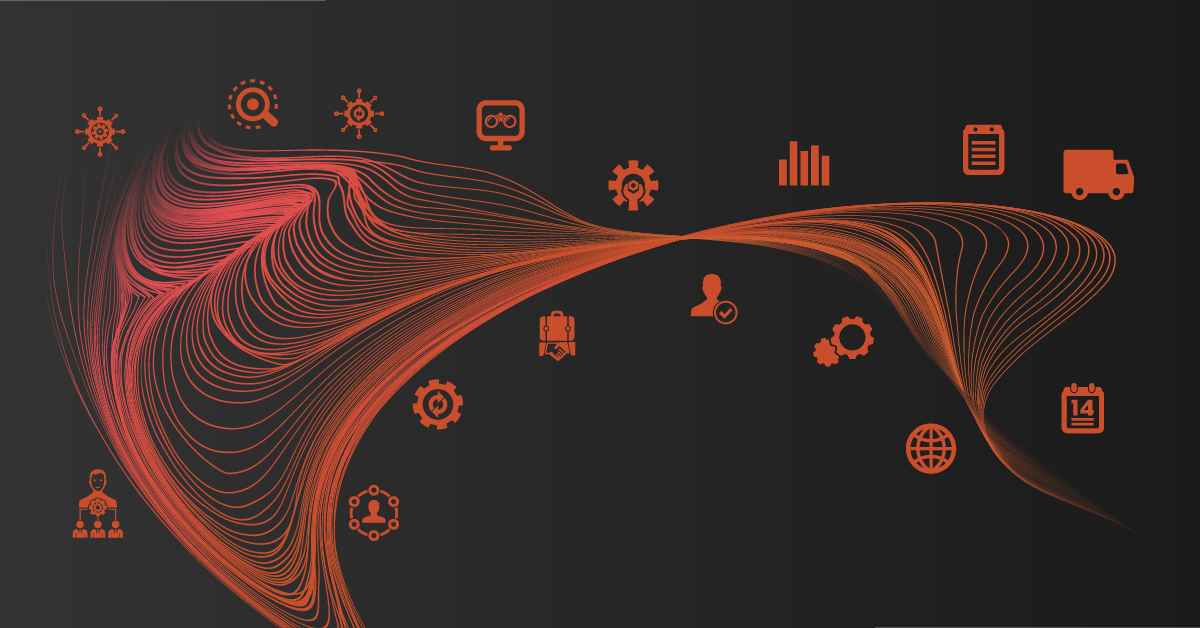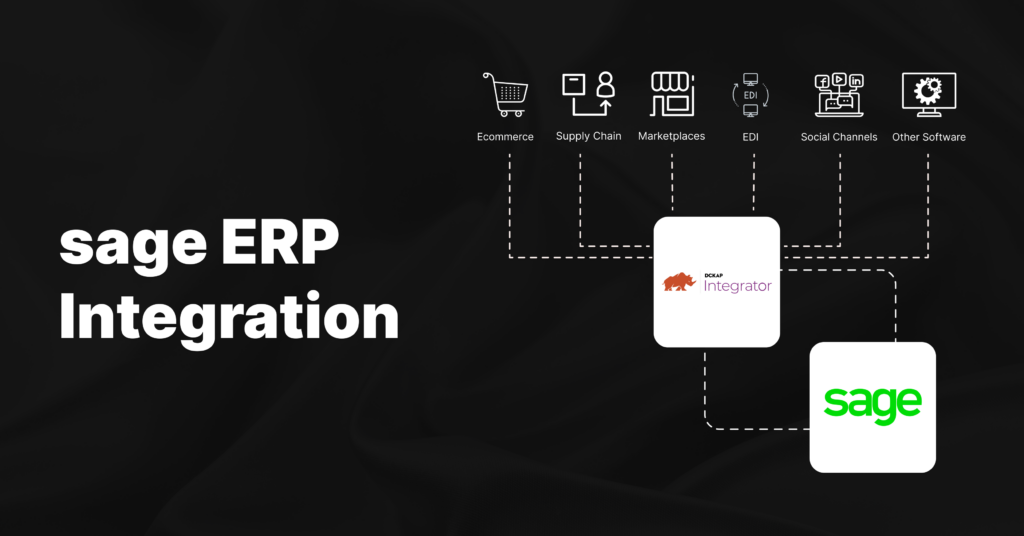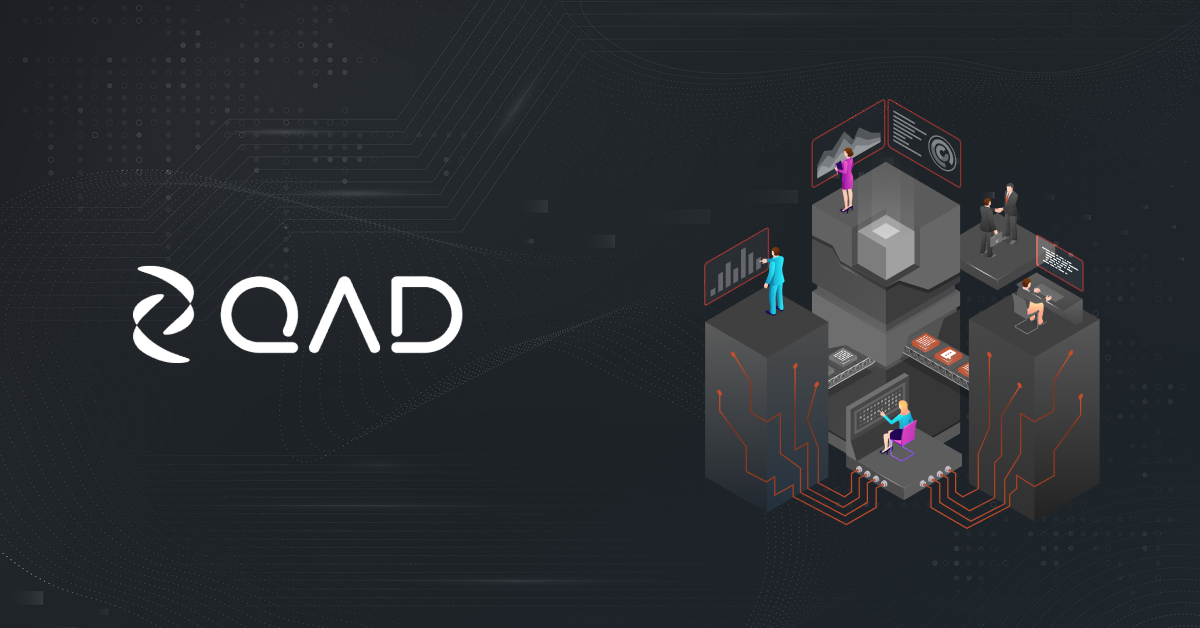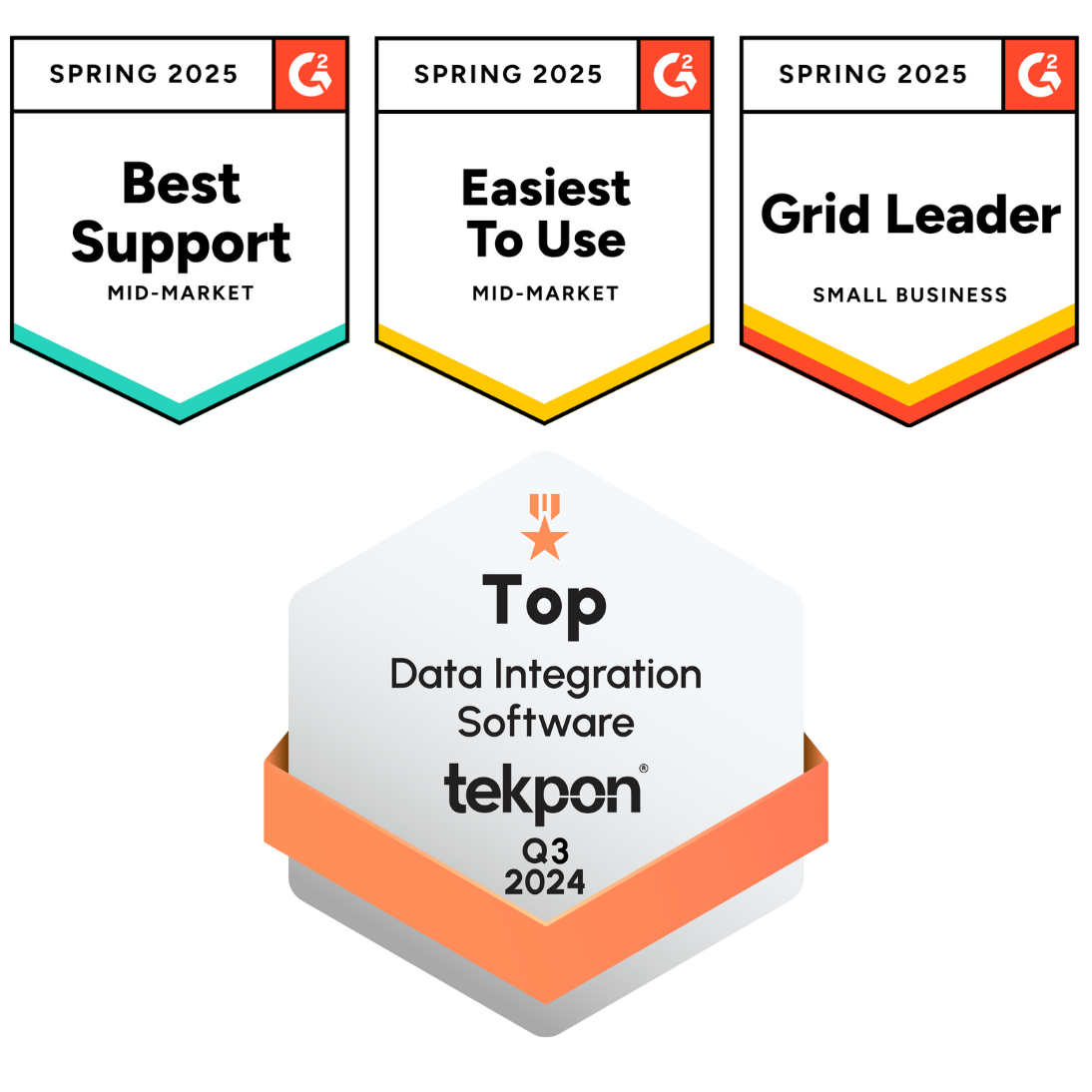Integration refers to the harmonious connection between various systems, processes, and software solutions that collectively enable the smooth flow of information and operations within a wholesale distribution business. However, the advantages of integrating your business applications become truly realizable when it is seamlessly executed.
What Counts As Seamless Integrations?
In this context, seamless integration refers to the unobtrusive and effortless interaction between different business tools, leading to uninterrupted and streamlined workflows for distributors. Depending on how you go about integrating your systems, there may be specific advantages and challenges. Seamless integrations ensure that the key intent behind the integration is met. To do so would also require connecting specific sources of data depending on a distributor’s tech stack.
Methods of Seamlessly Integrating Your Business Applications
Point-to-Point Integration
Point-to-point integration involves creating direct connections between two specific systems. While this method can be relatively simple and cost-effective for connecting a small number of systems, it can become complex and challenging to manage your website as the number of connections grows.
Custom Integration
Custom integration refers to building tailored solutions from scratch to connect various systems. Custom integration empowers you as an end-user to take better control of your integration strategies, adapting technology to your unique business requirements.
These integrations are suitable when you have very specific requirements that can’t be met by off-the-shelf solutions.
Third-party Integration
Third-party integrations involve using ready-made solutions provided by external vendors to link different systems. These solutions often come with pre-built connectors and interfaces, allowing you to connect systems without extensive development. Third-party integrations are particularly useful when integrating common software, such as CRM, ERP, e-commerce platforms, and more.
While third-party solutions offer convenience, they might not always perfectly align with the distributor’s specific requirements and might require some customization.
Each of these methods of seamless integrations for wholesale distributors has its own set of pros and cons, and the choice depends on your business needs, resources, and long-term goals.
Top 7 Types of Seamless Integration for Wholesale Distributors
Let’s explore the various integration types that can bring substantial benefits to wholesalers.
1. ERP (Enterprise Resource Planning) Integration
Imagine all your business functions — from finance and inventory to sales and procurement — streamlined in one cohesive system. That’s the power of ERP integration. It connects all these critical aspects into a single hub, allowing wholesale distributors to manage their resources, processes, and data seamlessly.
ERP integration minimizes data duplication, improves accuracy, and offers a holistic view of your operations, helping you make informed decisions. As a key repository of business information, connecting systems to your ERP can help it be a true single source of truth.
2. CRM (Customer Relationship Management) Integration
Customers are the backbone of any business, and CRM integration empowers your team to provide them top-notch service. By syncing customer data, sales history, and communication logs, you gain insights that allow personalized interactions and more efficiently targeted marketing efforts.
CRM integration reduces manual data entry, minimizing errors and ensuring consistent and accurate information across systems. It also allows customers to easily access their account information, order history, and support tickets, enhancing their self-service experience and thereby building stronger relationships.
Related read: Top 10 CRM Solutions for Distributors
3. eCommerce Platform Integration
Integrating eCommerce platforms with internal systems is crucial for wholesale distributors. eCommerce integration automates the process of syncing product information, inventory levels, and orders between the online store and the distributor’s backend systems.
This ensures that customers have access to accurate pricing and inventory information in real time, helping them make informed purchasing decisions, while distributors efficiently perform sales management.
4. Inventory Management System Integration
Integrating the inventory management system with other systems like ERP and order management solutions enables distributors to optimize stock levels, reduce carrying costs, and prevent stockouts. Real-time visibility into inventory data information helps in efficient demand forecasting, timely replenishment, and maintaining the right balance between supply and demand.
Inventory management system integration allows customer support agents to provide customers with up-to-date information on the status of their orders, including shipping and delivery updates, leading to improved accuracy, responsiveness, and efficiency in customer interactions and customer satisfaction.
5. Order Management System Integration
When the order management system is integrated with other business applications, companies can ensure accurate order processing, timely shipments and order tracking, and efficient warehouse management.
This integration eliminates manual errors, minimizes order processing time, and enhances overall customer satisfaction. Order Management System integration contributes to a seamless wholesale distribution solution by enhancing product data, inventory management, customer experience, and warehouse operations.
6. Accounting Software Integration
Financial management is at the core of any business. Integrating your accounting software with other systems is a great choice to ensure that financial transactions are seamlessly recorded and reconciled across different departments.
This integration automates invoice generation, tracks payments, and reconciles accounts accurately which not only saves time but also reduces discrepancies, and helps maintain a clear financial picture. Integrated accounting software automatically records purchase orders and captures sales data in real-time, allowing for accurate tracking of revenue as sales occur.
7. Supply Chain Management Integration
A well-managed supply chain is crucial for wholesale distribution companies. Integrating supply chain management systems with various partners, suppliers, and logistics providers facilitates real-time collaboration and data sharing.
This integration enhances visibility into the entire supply chain, helping distributors respond swiftly to changes and optimize procurement processes. Supply chain management integration enhances fulfillment processes, and provides accurate data to assist the sales team with up-to-date information. It leads to smoother operations, better decision-making, and improved customer experiences across the supply chain and sales functions.
In a nutshell, by connecting different software systems and processes, wholesale distributors can unlock greater operational efficiency and agility in adapting to market shifts in addition to improved customer satisfaction.
Now that we know the types of seamless integrations for wholesale distributors, let’s get into the different ways to integrate.
Best Solutions That Offer Seamless Integration for Wholesale Distributors
Here are seven leading integration solutions that can revolutionize the operations of your wholesale business through seamless data flow:
DCKAP Integrator
The DCKAP Integrator is the best solution for distributors within the iPaaS market. Created with distributors’ unique requirements in mind, the DCKAP Integrator stands as a robust cloud-integration platform that effortlessly facilitates the connection and synchronization of data across diverse systems.
A notable aspect that sets the DCKAP Integrator apart is its remarkable flexibility, allowing distributors to personalize it according to their specific demands. From integrating multiple systems to tailoring workflows, the DCKAP Integrator empowers distributors to shape the platform to their preferences, ensuring their business operations run precisely as desired.
Cleo Integration Cloud
Cleo Integration Cloud is your dedicated partner in navigating the complex integration landscape. They offer a variety of integration solutions tailored to your needs. Whether you require API-based, EDI (electronic data interchange), or non-EDI integrations, Cleo has a flexible consumption model that adapts to your preferences.
Cleo empowers you to achieve genuine end-to-end integration, reaching into your ERP, TMS, and WMS systems. By leveraging our connectors and pre-built integration flows, you create a seamless operational landscape. This means you can focus on what truly matters—delivering exceptional customer service.
MuleSoft
MuleSoft’s Anypoint Platform is an all-encompassing platform uniting iPaaS, automation, and universal API management through an API-led connectivity approach. It caters to a plethora of enterprise integration patterns like file transfer, shared databases, messaging, and more.
Operating in both cloud (private/public/hybrid) and on-premises realms, MuleSoft provides a rich repository of prebuilt cloud connectors, templates, APIs, and reusable integration components. Its innovative low-code/no-code solutions enhance efficiency, while the Anypoint Platform empowers developers to discover and build APIs seamlessly using CI/CD pipelines or from scratch. MuleSoft emerges as a versatile solution for agile and efficient integration across diverse systems.
Celigo
Celigo’s iPaaS is an integration software that’s highly adaptable and scalable, residing in the cloud. Its scalability enables seamless integration of new systems, channels, and partners, ensuring that growth doesn’t hinder operations but rather supports them.
With its strong focus on enterprise-grade security and governance, it’s an ideal solution catering to a wide range of integration needs, including B2B connections, data synchronization, and application linkage.
Oracle Integration Cloud
Oracle Integration Cloud presents a dynamic suite of integration services tailored to meet the distinct needs of businesses today. This solution serves as a robust bridge, seamlessly connecting a wide range of applications and data sources, including Salesforce, SAP, Shopify, Snowflake, and Workday.
Oracle Integration Cloud equips companies with the tools to streamline their operations. The prebuilt adapters simplify the process of connecting diverse applications and data sources, while the low-code customization offers the freedom to adapt the solution to specific business requirements.
Jitterbit
Jitterbit‘s Harmony empowers businesses to adapt to changing market conditions rapidly. Whether it’s integrating new applications, responding to shifts in customer demands, or optimizing internal workflows, Harmony’s capabilities enable distributors to remain agile and responsive and ease their back-office inventory management.
Boomi
Boomi excels in connecting the dots across various aspects of your business ecosystem. Whether it’s data, devices, systems, or people, Boomi’s capabilities ensure a seamless connection. This unified approach simplifies complex integration processes, facilitating the smooth flow of information and operations.
Boomi facilitates centralized monitoring, enabling distributors to keep a close watch on the health and usage of APIs. The platform’s rollback and version control, coupled with a unified reporting console, simplify management, making it easier to maintain and optimize integration processes.
As the digital landscape continues to evolve, the need for interconnected systems, streamlined processes, and real-time data exchange becomes increasingly evident. Now is the time to take action.
Evaluate your current systems, identify pain points, and envision the possibilities that integration can unlock. Engage with the best integration providers, explore their offerings, and prioritize solutions that align with your unique needs and goals. Sign up for a demo of DCKAP Integrator today and say goodbye to operational inefficiencies and manual headaches.
FAQS
What is seamless integration for wholesale distributors?
Seamless integration for wholesale distributors is a means to connect different software and systems so that they work together smoothly, improving the efficiency of wholesale distribution operations.
What is an integrated system in wholesale distribution?
An integrated system in wholesale distribution refers to the coordination of different software and processes, allowing them to work together seamlessly.
What types of integrations are important for wholesale distributors?
Integrations like ERP, CRM systems, E-commerce platforms, Inventory Management Systems, and more help distributors connect different parts of their business.
How does seamless integration aid the fulfillment processes?
Seamless integration connects various systems used in fulfillment, like order processing and inventory management, ensuring a smoother and more efficient workflow.
What role does distribution management play in wholesale distribution?
Distribution management involves overseeing the entire distribution process, including inventory, orders, and deliveries, to ensure smooth operations.
How can an integrated system streamline team communication in wholesale distribution?
Integrated systems provide real-time data to all team members, enabling effective communication and quicker decision-making.
What is wholesale distribution software?
Wholesale distribution software is a comprehensive platform designed to manage various aspects of wholesale businesses, including order processing, inventory management, and customer relations.
Are wholesale distribution software and integration solutions the same? What’s the key distinction between wholesale distribution software and integration solutions?
No, they serve different purposes within a wholesale business’s operations.
Wholesale distribution software manages internal operations, while integration solutions enable smooth communication between different software systems.





